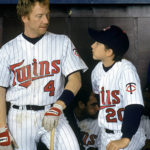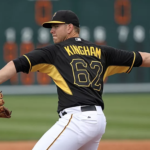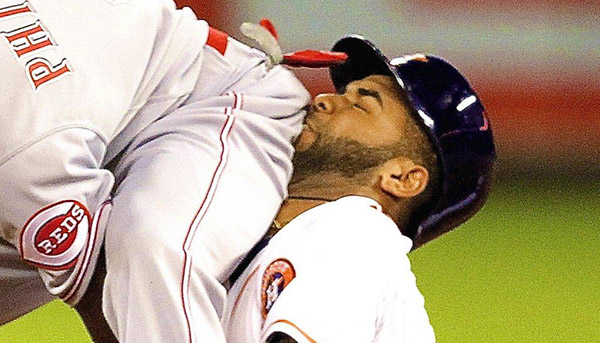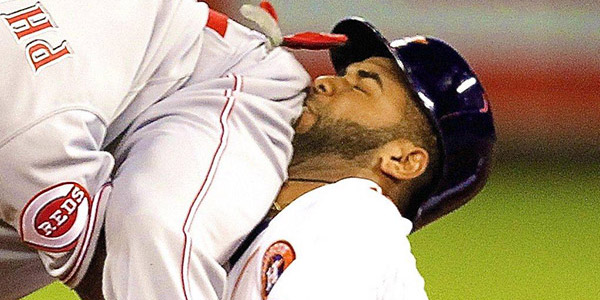Why David Price Exchange Makes No Sense for Red Sox, Dodgers
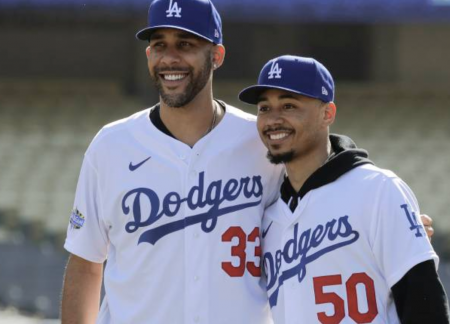 After what seemed like a month, despite being just a week, the Red Sox and Dodgers (with help from the Twins) finally completed a trade sending superstar Mookie Betts and David Price to the Dodgers. The Red Sox acquired Dodgers prospects Alex Verdugo and Jeter Downs while the Twins received Kenta Maeda from L.A. in the three-team swap.
After what seemed like a month, despite being just a week, the Red Sox and Dodgers (with help from the Twins) finally completed a trade sending superstar Mookie Betts and David Price to the Dodgers. The Red Sox acquired Dodgers prospects Alex Verdugo and Jeter Downs while the Twins received Kenta Maeda from L.A. in the three-team swap.
The most bizarre piece of this transaction was the inclusion of David Price. Obviously, the Red Sox were trying to shed a bad contract, but why do it here? And if you’re the Dodgers, why take it on such a high-dollar and, likely, low-value option? Makes no sense for several reasons.
If you’re attempting to trade a Mookie Betts-caliber player, the number-one thing you can’t do is sell short. The Red Sox did get Verdugo, a former No. 1 prospect, but beyond that, it was a lower haul than expected. The Red Sox didn’t pry away any Dodger pitching prospects, of which they have two in the MLB Pipeline Top 100. The primary reason? The Dodgers take on the remaining $96 million of Price’s three-year contract.
The Red Sox need pitching badly, and sacrificing Price and his money, while still having to pay other bad contracts to Pablo Sandoval and Rusney Castillo, didn’t improve the rotation. Getting pitching prospect Dustin May, or multiple good young pitchers from the Dodgers would have made more sense. Since it’s too late to use the extra $32 million saved from shipping off Price, the Red Sox were probably better off staying cash-strapped in the short term before flipping big contracts in July if they over-performed, similar to what the Diamondbacks did last season with Zack Greinke.
A big reason Boston brought in Chaim Bloom as Chief Baseball Officer is his expertise in identifying and developing young talent, and finding gems while they are cash-strapped — bringing a small-market Rays mentality to a big-market Red Sox team. Therefore, it’s surprising he left value on the table, especially in pitching. While the Red Sox return wasn’t bad, it could’ve been better.
From the Dodgers’ standpoint, they’re all in. But if you’re going to trade for Mookie Betts, you should do whatever you can to re-sign him. The Dodgers had only about $8 million of leeway before they hit the $208 million luxury tax threshold prior to the trade. Taking on Bettt’s and Price’s contracts, combined with what they traded, L.A. is currently $14.1 million over the luxury-tax mark. Will it be worth it?
With big contracts looming soon for future stars Cody Bellinger and Walker Buehler, this could mean more players could be sacrificed when the time comes to sign them, unless they extend them early, like the Braves and White Sox did with their young stars. Even so, we saw the Dodgers already sacrifice Maeda in order to acquire Betts and Price, and they were close to sacrificing Joc Pederson and Ross Stripling to the Angels, as well.
The reason it looks even worse is Price, at this point in his career, is similar to Maeda, a third or fourth starter who can pitch out of the bullpen in the playoffs. With Price’s playoff woes, do you really want to gamble on his fortunes changing for $32 million when you already have a $31 million pitcher who is choke-prone in the playoffs (Clayton Kershaw)? With the Dodgers already having the deepest, most versatile roster before acquiring Betts, trading a little extra when it comes to prospect capital shouldn’t be an issue.
In addition to Dustin May (No. 23 in MLB.com Pipeline rankings), they also have Josiah Gray (No. 67) and Tony Gonsolin, who only fell out of the Top 100 recently. Why not trade one of those guys in addition to Verdugo and Downs to not have to take on the Price contract, even if it means throwing in one more mid-level prospect? David Price is a bad contract and a historically bad playoff pitcher going to a team that is in World Series-or-bust mode. How does this make sense for them?
The goals should’ve been simple. If the Red Sox were going to trade Mookie Betts, they shouldn’t sell short on the second-best player in baseball. So, while they weren’t fleeced, they could’ve done better. For the Dodgers, if they want to make the flashy trade for a superstar, they better have a plan to re-sign him, as well as the rest of their young core. With no holes on their roster, trading extra prospects to the Red Sox shouldn’t have been a big deal if it allowed them to keep Kenta Maeda and avoid David Price.
